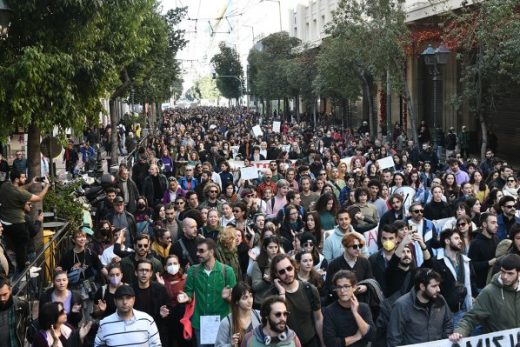
A Paper by Fernando M. Forattini
Fernando Miramontes Forattini
PHD in History at PUC-SP / University of Chicago
Co-Founder of Corruption in the Global South Research Consortium
Download the Paper on PDF here: FOR A BROADER UNDERSTANDING OF CORRUPTION AS A CULTURAL FACT, AND ITS INFLUENCE IN SOCIETY
Introduction
This brief article intends to demonstrate some of the problems with the main theories on
corruption and introduce the reader to the new field of Anthropology of Corruption, a type
of research that tries to understand one of the most pressing issues nowadays through a non-
binary point of view, but trying to understand the root of corruption, and its multifaceted
characteristic, especially through its cultural aspect; and why it is, contemporarily, the most
effective political-economic discourse – most at the times used in a populistic fashion, at
the expense of democratic institutions. Therefore, we will briefly analyze the three main
theoretical strands on corruption and point at some of its faults; then indicate to the reader
what are the main goals Anthropology of Corruption, and what questions it seeks to answer;
and, finally, the political impact that corruption discourses have on society, and its perils when
instrumentalized in populistic discourses.
Contextualization and problematization
Corruption is usually viewed by society from its original Latin term of “corruptĭo”, meaning
“deteriorated”, “rotten”. From the theoretical point of view corruption will almost always be
treated, with more complexity, from this perspective, highlighting the putrefaction of a sector
related to morals, be it of society, economics, politics, etc.
Broadly speaking, we can summarize the four major modern theories on corruption, since
the XX century, as follows. First, the most socially accepted definition of corruption is that it
resides in the dispute of, on the one hand, private interests and, on the other, the interests of
the social whole. Thus, corruption would reside in an option between the prevalence of the
private interest against the public, resulting in the putrefaction and demoralization of values
and customs shared by the whole.
However, this definition, not entirely wrong, but simplistic, needs to be problematized.
For Susan Rose-Ackerman (2002), corruption should be linked to the state’s own social and
economic structure. Corruption not only produces more economic externalities, but creates or
reinforces economic, social, and political inequality. The State is more ineffective in allocating
its resources, and its decision-making no longer aims at the prevalence of the whole, mainly
affecting the feeling of injustice and disbelief in institutions and in the political class, resulting
in a collective perception of discredit, especially in the democratic system.
Another main theory was created in the field of Social Sciences since the late 1950s (BAN-
FIELD, 1958), supported by the so-called “development studies”, called Structural Theory.
It believes that corruption is a problem linked to economic, political, and moral underdevel-
opment. This theory would be a stereotype of a colonialist discourse on the “primitivism” of
certain societies and their evils in contrast to the institutional, economic, and moral “virtues”
of the “developed countries”. Corruption would be a social pathology typical of “Third World
countries”, using their jargon, in its “state-formation phase”. The theorists of this conception
assumed that corruption would disappear with the increase of more rational -organizations in
key-sectors of the State.
A more modern view of this theory, utilized in the field of International Relations, seeks to
update the previous concept by introducing quantifications and comparisons through various
formulas and surveys that would map the most and least corrupt countries and thus predict
the necessary actions. The problem is that their methodology and their recipes for “good
governance” are said to be neutral (HALLER; SHORE, 2005), however, they do not consider
social, economic, and political inequalities between different countries. Terms like “public
good”, “private gain”, “public interest” are not thoroughly defined and problematized, leading
them to prescribe universal “remedies” to problems that despite being a global concern, and
globalized, has its own specificities.
For an anthropological view of corruption: explaining the root of its political force.
The main point of this new theory (which started in the late 1990s) is that we must not un-
derstand the term corruption by its restrictive, provincial, and puritanical connotations; but
as something more subtle and complex, like a “conversation, a ritual” (VISVANATHAN;
SETHI, 1998: 3). The concept of corruption, for this theory, would be a form of exchange
in society: a polysemic relationship and an important part of the way in which individuals
connect with the State (HALLER; SHORE, 2005: 7). In this sense, it is both an enigma, and
a social fact, in the Durkheimian sense. What matters most about it – whether as a social per-
ception or as an object of study – is not so much the reality of its existence as the fact that it is
widely believed to exist. The narratives created around this belief are essential for individuals
to feel connected to the public arena and to seek some way to participate in it: through it,
they can make sense and feel connected with politics, however far removed from the political
system.
Various anthropological studies have noted that even though there are issues more pressing
for these groups, like the situation of their crops, public policies, etc., they will focus their
conversations on the topic of corruption. In a coordinated research across India, “corruption
talks” prevailed over any other topic (VISVANATHAN; SETHI, 1998). The study noted that
stories about corruption in rural areas are more frequent than folklore and even more than
discussions about the state of crops and public policies about them (ibid.). In Bolivia, equally:
“people just talked about corruption non-stop: corruption was how they made sense of politics
and the state” (LAZAR apud HALLER; SHORE, 2005, p. 216). The same was seen in
comparative studies on corruption in Latin America and Europe (MITCHELL, 2002).
Another critique by this field of study, is that corruption should not be treated as a “closed
subject”, as many intellectuals and policymakers do – focusing more on its accountability
side. As shown above, most of the terms used by the main theories on corruption are extremely
mutable in time, regions, and cultures. Others, come from points of view that are not based on
data, or strict methodological investigations, but from a outdated “moral authority” of some
countries over another. And even recent theories, that base themselves in good governance and
transparency, relies mostly on perception on corruption (e.g. the most influential “corruption
ranking” is from Transparency International and it is called Corruption Perception Index) by
some selected individuals. Therefore, questions on how scientific these rankings are; and how
much “neutral” are their recipes for good governance, are brought to light by this new field
of study that seeks to understand the problem paying attention to the diverse meanings, and
representations that comes with the elusive term of corruption, and its impact on daily life
and, when used alongside Political Science, on the political realm.
The strength of the anti-corruption discourse as a political instrument
Therefore, we can see how the economic-juridical analysis fall short to explain the roots
of corruption and its influence in society. If corruption, and its rejection expressed on the
anti-corruption discourse, is the main way people connect themselves with the public arena,
each time more apart from them with the reduction of the welfare-State – especially in post-
communist countries – it can be expected that the topic of corruption would be the most uti-
lized and instrumentalized in the political arena.
Since the 1990s, with the fall of the Berlin Wall, we have entered what most scholars call an
“era of relative consensus” on certain ideological topics that were once regarded as traditional
disputes, with rare exceptions. This, plus the crisis of social democracy, and the growing lack
of confidence in globalization, demanded a new form of political organization and the way
political parties communicate with their constituencies, incentivizing a form of politics that
to draw support of their electorate politicians will try to distinguish themselves from their
opponents especially using “valence-values” at the expense of a propositional debate.
The emphasis in valence-values is relegated to the concept of “corruption” above any other
values or political-economic topics. Studies (CURINI, 2018) shows that the focus on corrup-
tion increased the number of votes by 5.6 % in the last elections of the European Parliament,
a huge electoral advantage. Its influence in parties’ manifestos is increasing exponentially:
more than 1.17% of all quasi-sentences of these manifestos are dedicated to corruption and
correlated valence values, more than topics such as economic planning, multiculturalism, mil-
itary spending, and immigration.

Figure 1. Relationship between Emphasis on Corruption and Time Source: Curini, 2018: 7
This type of political focus, despite calling attention to an important issue (since corrup-
tion is responsible for almost 30% of the diversion of business done in the world and for
most deaths in the world), has a detrimental aspect on the electoral process, on democracy,
and on the fight against corruption itself, since it is being usually instrumentalized for pop-
ulistic purposes. Frequently, these discourses portray democracy as an insufficient system to
deal with corruption and inequalities, creating a vicious circle: it creates incentives to nega-
tive valence values campaigns, creating an attitude of discontent and alienation in relation to
democracy and institutions; forging a decline in confidence and generating a dynamic of self-
reinforcement of discrediting in favor of more negative discourses; and it does not fight real
corruption, because the perception of corruption actually favors them politically, but enhances
the perception of democracy as a flawed system.
As discussed earlier, it is not so much the real presence of corruption that impacts society,
as much as the perception of it. As Figure 2, below, shows us, there is clear evidence that
the emphasis on corruption in political discourses is high above average in countries where
there is high perception of corruption, many times not correlating with the presence of real
corruption (e.g. Japan in 1996).

Figure 2. Emphasis on Corruption and the Corruption Perception Index (Transparency Inter-
national) Source: Curini, 2018: 10
Final Considerations
In this brief “academic research letter” we tried to indicate a new and extremely important
discussion that is happening in the Academy on the topic on corruption. It started because
research understood that the traditional legal, political, and economic models despite explain
certain facets of corruption, did not understood the root of its problems, why it was so broadly
accepted politically, and did not explained the current growing influence of corruption in
today public arena, with, most of the times, a detrimental effect on democracy by populistic
politicians/governments.
References
Banfield, Edward. The moral basis of a backward society. Chicago: Free Press, 1958.
Curini, Luigi. Corruption, Ideology, and Populism. London: Palgrave Macmillan, 2018.
Forattini, Fernando Miramontes. Corruption: what it is, how it affects us, and ways to fight
it. Curitiba : Brazil Publishing, 2020.
Haller, Dieter, and Chris Shore. Corruption: anthropological perspectives. Londres: Pluto
Press, 2005.
Mitchell, Jon. Ambivalent europeans: ritual, memory and the public sphere in Malta. Lon-
dres: Routledge, 2002.
Rose-Ackerman, Susan. “Democracy and ‘grand’ corruption.” International Social Science
Journal 149 (1996): 365–81.
Rose-Ackerman, Susan, and Ricardo Sá Fernandes. Corrupção e governo. Lisboa: Prefácio,
2002.
Visvanathan, Shiv, and Harsh Sethi. “By way of a beginning.” In Foul play: chronicles of
corruption 1947–97, by Shiv Visvanathan and Harsh Sethi. Nova Délhi: Banyan Books,
1998.
Source: Academia
Academia Letters, July 2021
Corresponding Author: Fernando Forattini, fernandomiramontes@yahoo.com.br
Citation: Forattini, F. (2021). FOR A BROADER UNDERSTANDING OF CORRUPTION AS A CULTURAL
FACT, AND ITS INFLUENCE IN SOCIETY. Academia Letters, Article 2245.
https://doi.org/10.20935/AL2245. 7
©2021 by the author — Open Access — Distributed under CC BY 4.0
#corruption, #politics, #economics, #culture, #transparency, #society, #moral, #anti_corruption, #regulation, #political, #fernandomiramontesforattini, #fernando, #miramontes, #forattini, #universityofchicago





